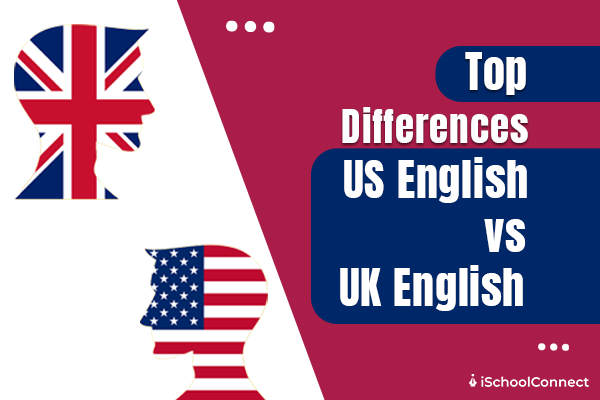Table of Contents
Research estimates that approximately 1.35 billion people worldwide speak English as a second language or natively in 2021!
Of the different countries that contribute to the global English-speaking population, the two biggest language players in the world are the United States and the United Kingdom. While the language may be the same, there are some key differences between UK English vs US English.
The United States does not have any recognized official language, but English (particularly American English) is used for official pronouncements, regulations, and legislation.
The United Kingdom, on the other hand, has a list of official native languages that is not limited to British English. These include Scots, Gaelic, and Wales!
Learning about the unique linguistic differences between UK and US English can help you hone excellent communication skills!
Keep reading to discover the key differences between UK English vs US English!
UK English vs US English –The History
- The British introduced English as a language to America between the 16th and 17th centuries. At that specific point in time, spellings had not been standard.
- In the United Kingdom, the writing of the first dictionaries by London-based scholars set in stone the way some- words are written.
- However, in the United States, a lexicographer by the name of Noah Webster allegedly changed the way words were spelled in America.
- This made the American spelling quite different from the British spelling, establishing cultural independence from British rule.
- Therefore, US English spelling was created as a form of protest against the original UK English.

Spelling Differences
- An interesting fact is that French, as a language, has influenced UK English in several ways.
- As a result, UK English has a lot of linguistic similarities to French than to US English.
- This is one of the key differences between UK English vs US English that is highlighted by spelling as a result of unique evolution.
- Some of the key spelling differences are as follows-
UK English
- Use of -oe- and -ae-
Example – Encyclopaedia, diarrhoea, anaemia, etc.
- Use of – t
Example – Leapt, dreamt, burnt, etc.
- Use of -ogue
Example – Catalogue, monlogue, analogue, etc.
US English
- Use of -og
Example – Catalog, monolog, analog, etc.
- Use of -ed
Example – Leaped, dreamed, burned, etc.
- Use of -e-
Example – Encyclopedia, diarrhea, anemia, etc.
Differences in Vocabulary
- In the comparison of UK English vs US English, a key point of difference is the vocabulary used to describe everyday objects and things.
- The reason why the same objects are referred to differently lies in the evolution and cultural influences that have independently affected both – UK English and US English. Here are some examples-
| UK English | US English |
| Bonnet | Hood |
| Flat | Apartment |
| Trousers | Pants |
| Lorry | Truck |
| Crisps | Chips |
| University | College |

Use of Tense
- While understanding the UK English vs US English comparison, an important difference is the use of tense.
- UK English often requires the use of present perfect tense to describe a past action that is considered relevant to the present.
- US English, on the other hand, uses past simple tense when the action in question is just finished. This is especially highlighted with the use of adverbs such as yet, just, and already. Here are some examples:
UK English – Have you done your homework?
US English – Did you do your homework yet?
UK English – She has had lunch.
US English – She already had lunch.
Use of Collective Nouns
- With UK English vs US English, there is a stark contrast in the use of verb forms with collective nouns.
- In UK English, plural or singular verbs can be used in conjunction with a collective noun (a noun that refers to a group of things or people).
- In contrast, US English uses a singular verb in tandem with collective nouns.
Here are some examples-
UK English – My team is/are winning the competition.
US English – My team is winning the competition.
UK English – My family are visiting from Canada.
US English – My family is visiting from Canada.
The Use of ‘Shall’
- Another final point of comparison in UK English vs US English is the use of the word ‘shall’.
- Shall is often used when offering to do something or when making a suggestion.
- In US English, it is very unusual for speakers to use the shall. An alternative to this word is Can/May/Should/Would and Do.
Here are some examples:
UK English – Shall we try doing that again?
US English – Should we try doing that again?
UK English – Shall I roll down the window?
US English – Can I roll down the window?
UK English – Shall we meet at the restaurant at 6?
US English – Do you want to meet at the restaurant at 6?
Key Takeaways
- English is recognized as the most widely spoken language in the world. Two of the biggest English-language speaking countries are the United States and the United Kingdom.
- Despite the language being the same, there are some key points of difference between UK English and US English.
- The differences are rooted in history and have been impacted by the independent evolution of the language in both countries.
- Understanding the differences between UK English and US English is an excellent way to foster remarkable communication skills. This can help you convey messages that are clear, effective, and “correct” in the most local sense.
We hope you found this blog informative. Don’t forget to comment below and share your thoughts! You can also get in touch with us if you have any doubts.
Liked this blog? Read: 60 new words in English with meanings!
FAQs
Q1. Who created the dictionary standardizing spelling in the United Kingdom?
Answer – Samuel Johnson (in addition to six other helpers) created one of the most famous dictionaries in the world. Named ‘A Dictionary of the English Language’, this was the first published text to standardize spellings in UK English.
Q2. What is the reference of ‘biscuits’ to as in US English?
Answer – ‘Biscuits’ is a word in UK English. It’s US English counterpart is ‘cookies’.
Q3. What is rhotic speech?
Answer – The first settlers in America made use of rhotic speech. In this speech, you pronounce the r sounds. The higher classes in the United Kingdom wanted to distinguish themselves from the common masses in the use of English. The tone is put to use in a soft manner to pronounce the r sound.






